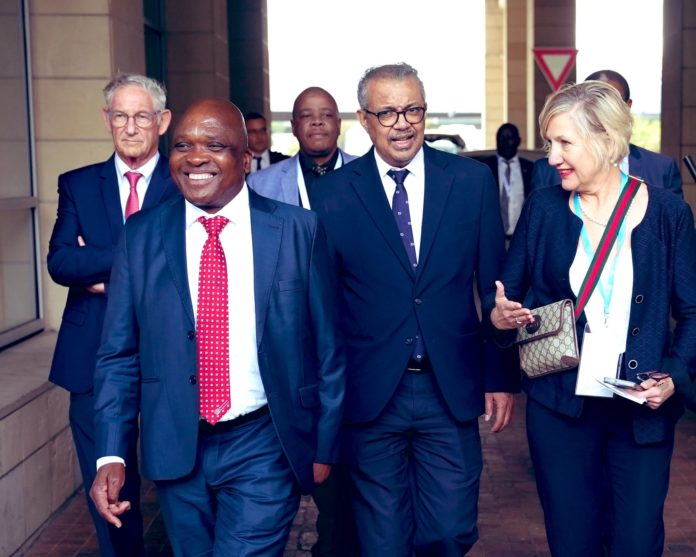Health Minister, Dr Joe Phaahla, believes successful technology transfer and establishment of vaccine manufacturing hubs positively influence national and regional economic development and create health security for people.
“Vaccination is widely touted as amongst the most effective health interventions available.
“It is therefore greatly heartening to us to note the progress of the mRNA technology transfer programme and vaccine development among the hub and spokes of this programme,” Phaahla said on Thursday.
The Minister was speaking at the World Health Organisation (WHO) mRNA technology transfer hub meeting, in Cape Town, where over 200 international participants met for the first time face-to-face.
Joined by WHO Director-General, Dr Tedros Adhanom Ghebreyesus, and Higher Education, Science and Innovation Minister, Dr Blade Nzimande, together with high-level officials from funding countries, the gathering reviewed the progress since WHO and Medicines Patent Pool (MPP) launched it in June 2021.
Today, WHO’s global mRNA vaccine technology transfer Hub in #SouthAfrica has been inaugurated.
The Hub will fill the gap in global vaccine supplies by providing low- and middle-income countries with equitable access to this life-saving technology.
More: https://t.co/AMtIp5CFE3 pic.twitter.com/6eTIzLtpiH
— World Health Organization (WHO) (@WHO) April 20, 2023
The hub will fill the gap in global vaccine supplies by providing low-and middle-income countries equitable access to this life-saving technology.
The Messenger RNA (mRNA) also known as mRNA vaccines are created in the laboratory to teach cells how to make a protein that triggers an immune, which produces antibodies to help protect us from getting sick from that germ in the future.
The Minister said he hopes that this move will spearhead a situation where the vaccine inequity that marked the early phases of the COVID-19 pandemic will never happen again.
“This hub will strengthen regional health security and respond more equitably to the current COVID-19 pandemic and future pandemics.
“We look forward to a greater and more diversified vaccine manufacturing capability and capacity for the development of vaccines that can be made cost-effectively and quickly distributed throughout Africa.”
.@DrTedros arrives at Afrigen to celebrate the launch of Africa’s first end-to-end mRNA vaccine facility
& the next stage in the mRNA Technology Transfer Program
sharing knowledge among scientists across Africa, Asia & the Americas
toward vax equity & justice.#mRNATT2023 pic.twitter.com/Q0KOOZ8Iml
— Peter Maybarduk (@Maybarduk) April 20, 2023
Meanwhile, he said vaccine development at Afrigen Biologics and manufactured by the Biovac, which is partly owned by the South African government, and other spokes around the world have given new hope for a sustainable and affordable vaccination programme.
In addition, she said the department recognises that Afrigen is working with Biovac to revive local vaccine production in South Africa.
He believes that Biovac will be well placed to eventually manufacture and commercialise Afrigen’s COVID-19 mRNA vaccine and any other mRNA vaccines, reducing reliance on imports.
Afrigen has successfully established a COVID-19 vaccine manufacturing process at a laboratory scale and is currently scaling up that process to a level suitable for manufacturing vaccine batches to be used in Phase 1 and 2 clinical trials to good manufacturing practice (GMP) standards.
The Minister also called for innovative funding mechanisms in the medium-to-long term to ensure viability while the facilities are built to scale.
“This will only be possible if a far larger market is assured. For this reason, the domestic and continental vaccine manufacturing enterprise must be harmonised and collaboration strengthened.”
He is of the view that this could be done through regulatory strengthening and harmonised regulation within the African continent, appropriate trade incentives beyond the public health budget, market access, competitive pricing and guaranteed demand.
Nzimande said the vision is beyond COVID-19.
“The capabilities we are building are looking to empower us to deal with other future pandemics whose vaccines could use the same mRNA technology platform. It is a vision that has set its eyes on diseases that are prevalent in our environments such as malaria, tuberculosis and HIV and AIDS.”
Ghebreyesus said COVID-19 highlighted the need to address global health emergencies to increase the capacity of all regions to produce medical countermeasures, such as vaccines and therapeutics.
“I am immensely proud of the achievement of all those involved in this project; in less than two years we have shown that when we work collaboratively, we succeed collectively,” he said.
My remarks on @WHO mRNA Technology Transfer Programme https://t.co/kL3UmKddow
— Tedros Adhanom Ghebreyesus (@DrTedros) April 20, 2023


